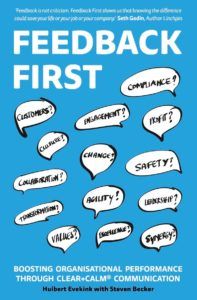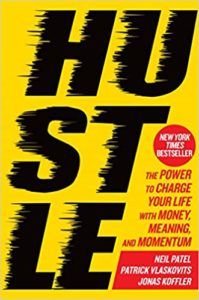
Months ago I wrote to Huibert Evekink, co-author of the Stevie Award winning book Feedback First to catch up after our editing work together and to find out how his book was doing. In particular, I asked him how the book served as a business booster to impact the start up he had launched with his book.
He was excited to report that the book he wrote with his business partner, Steven Becker, helped bring in clients from 5 major multinational corporations plus the Dutch Security Forces. His new company, FutureTeaming, now had a staff of four—two founders and two partners—who are training multinational teams to communicate more effectively across cultures and generations by learning how to give and receive feedback (the subject of the book). Futureteaming’s business has doubled since last year.
Huibert’s next step? Determine how to take the one-off projects with teams and turn them into company wide projects. Huibert wondered whether he needed another book to convince these higher level execs to hire them. With a multi-award winning book on the subject and plenty of expertise, I suggested he didn’t need another book. He just needed to show up in the right places a few times—get the attention of high level decision makers.
While one strategy is to work within those corporations, it would certainly be helpful to get the attention of CEOs, heads of HR and other top level decision makers in any way possible.
Here’s the strategy I offered Huibert. Perhaps you can use this strategy to support your business growth or book launch.
[bctt tweet=”How to Get High Level Executives Interested in Your Work” username=”LisaTener”]

Note, Huibert’s company would use this strategy to reach CEOs, HR heads and division heads, in order to get corporate wide training contracts. You can modify the strategy to reach any market and can use it to sell consulting, training or presentation services.
Step 1: Define Your Target Market: You probably have already done this. Who is the person who would hire you to provide training, speaking or consulting services? Who are the decision makers? This group may be different from the original market you wrote your book for (or the market you are writing your book for).
Step 2: Find out Where the Decision Makers Hang Out Online: In Huibert’s case, my first thought was the Financial Times. However, I don’t know the European market well and there may be more specific news sites that his target market go to.
Step 3: Blog on the Subject: Share case studies (disguised if need be) about the problems your team is helping to solve. Share specific steps blog readers can take to solve their problems. You can blog on your own blog or pitch a column or post to a larger, more established blog or news site.
Step 4: Get Active on Social Media: Follow those people who write for the news sites and website you identified in Step 2. Share their posts on LinkedIn and Twitter.
Step 5: Get More Active by Commenting: Comment meaningfully on these posts by identifying a point the writer makes that has helped you or that you intend to put into action. Share your own experience. Build upon something the author said.
Step 6: Share Your Own Posts: You don’t want to be spammy but once every 3 or 4 comments, you can share a link to a post of your own that’s relevant. When I suggested this commenting strategy to Victoria Dunckley, MD, with one Huffington Post comment and a link to her Psychology Today article, she grew her list dramatically, expanded her professional contacts, landed interviews in major media and eventually landed high profile speaking gig. Yes, all from a comment and link on one post on the Huffington Post. In the same way that journalists approached Dr. Dunckley for interviews, you may find journalists or bloggers approaching you—whether it be the person who wrote the original article or a journalist writing on a related subject.
Step 7: Approach said Journalists and Bloggers with Ideas for Posts or Articles: Once you’ve formed a relationship by commenting and sharing, you can approach these folks with your ideas for an article they might write where they would quote you. Or perhaps, once you get to know them, you can even ask them to introduce you to their editor and help you start a new column with a site they write for. I’ve heard Neil Patel suggest a similar strategy: he used it himself to become a columnist for Entrepreneur.com.
Here’s an extra gift: if you write for a major news site, your author bio can mention your book, your company and any awards you’ve won or other credentials.
The SEO Bonus for Your Book and Business
 Now, wouldn’t you like for the blogging you do to help your business show up when someone searches Google or another search engine for services like those you offer?
Now, wouldn’t you like for the blogging you do to help your business show up when someone searches Google or another search engine for services like those you offer?
Guess what? All that blogging will help your business show up!
In Neil’s case, many people probably look at his bio on Entrepreneur.com and click on the links to his sites.
Here’s Neil’s bio on Entrepreneur.com:
Neil Patel is co-founder of Crazy Egg and Hello Bar. He helps companies like Amazon, NBC, GM, HP and Viacom grow their revenue.
So, he probably gets a good deal of what’s called “direct traffic” from Entrepreneur.com. In addition, though, and at least as valuable, maybe more, I imagine the links from his Entrepreneur bio to four of his websites offer excellent SEO value for those sites as well (adding to the authority of his sites in the eyes of Google and helping his sites appear in keyword searches).
You can do this, too!


